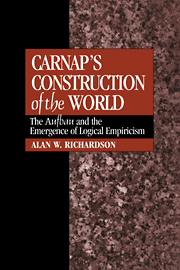Book contents
- Frontmatter
- Contents
- Acknowledgments
- Introduction
- 1 Reconstructing the Aufbau
- 2 The problem of objectivity: An overview of Carnap's constitutional project
- 3 An outline of the constitutional projects for objectivity
- 4 The background to early Carnap: Themes from Kant
- 5 The fundamentals of neo-Kantian epistemology
- 6 Carnap's neo-Kantian origins: Der Raum
- 7 Critical conventionalism
- 8 Epistemology between logic and science: The essential tension
- 9 After objectivity: Logical empiricism as philosophy of science
- Bibliography
- Index
9 - After objectivity: Logical empiricism as philosophy of science
Published online by Cambridge University Press: 30 October 2009
- Frontmatter
- Contents
- Acknowledgments
- Introduction
- 1 Reconstructing the Aufbau
- 2 The problem of objectivity: An overview of Carnap's constitutional project
- 3 An outline of the constitutional projects for objectivity
- 4 The background to early Carnap: Themes from Kant
- 5 The fundamentals of neo-Kantian epistemology
- 6 Carnap's neo-Kantian origins: Der Raum
- 7 Critical conventionalism
- 8 Epistemology between logic and science: The essential tension
- 9 After objectivity: Logical empiricism as philosophy of science
- Bibliography
- Index
Summary
i ended Chapter Eight with remarks about the development of Carnap's thought, especially his rejection of epistemology. I shall end our consideration of Carnap's early philosophy of empirical knowledge by examining more closely some of the major themes of this development as it occurred in the 1930s. This will indicate, I hope, that the interpretative framework within which we have been considering Carnap's early work can illuminate further developments as well. At the close, I shall indicate that from Carnap's point of view there can be no empiricism without dogmas, if we insist on using this term to characterize a view that claims methodological ineliminability of the analytic-synthetic distinction. To disagree with Carnap on this matter is to disagree with him about what empiricism is or could be.
FROM EPISTEMOLOGY TO THE LOGIC OF SCIENCE
In the mid-1930s Carnap rejected epistemology in no uncertain terms. This is most explicit in an address presented at the 1935 “Congress for the Unity of Science,” in Paris, entitled “Von Erkenntnistheorie zur Wissenschaftslogik” (From epistemology to the logic of science; hereafter VEW). In this essay, Carnap invited his audience to view current developments as a move to a third stage of scientific philosophy. In the first stage, scientific philosophy had rejected metaphysics. This ushered in a “transition from speculative philosophy to epistemology” (VEW, p. 36). The second stage had involved the rejection of the synthetic a priori and the consequent adoption of empiricism in epistemology.
- Type
- Chapter
- Information
- Carnap's Construction of the WorldThe Aufbau and the Emergence of Logical Empiricism, pp. 207 - 229Publisher: Cambridge University PressPrint publication year: 1997



